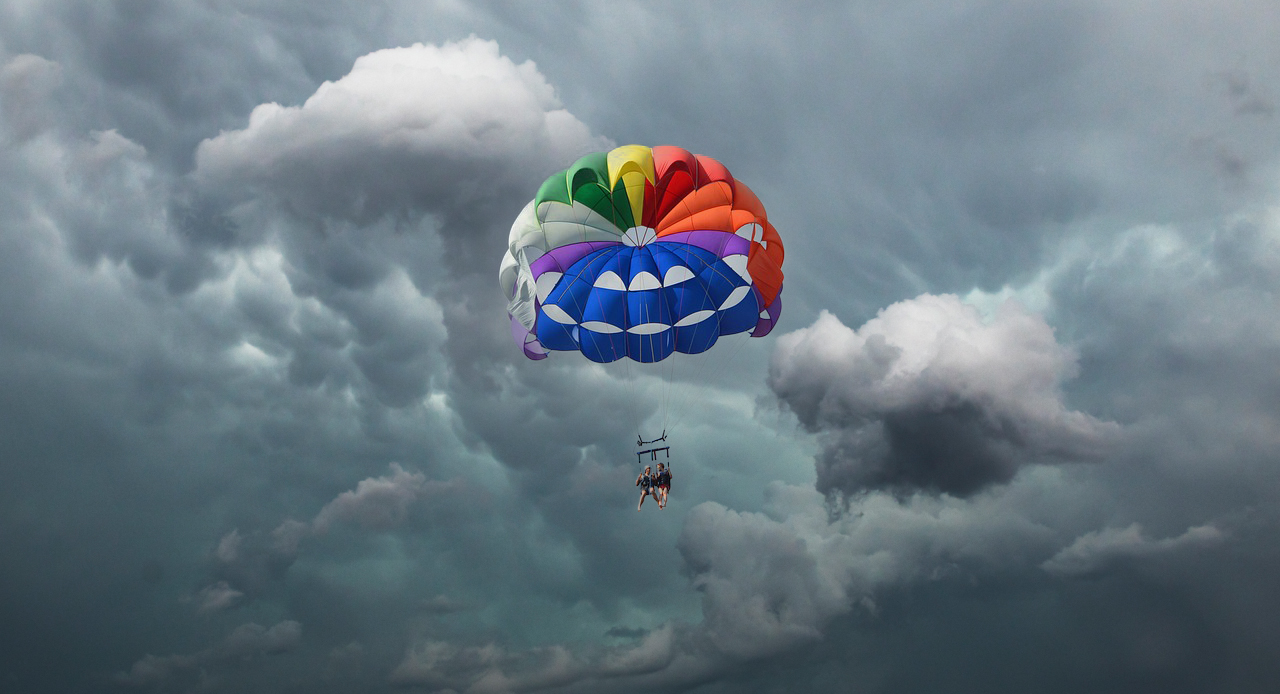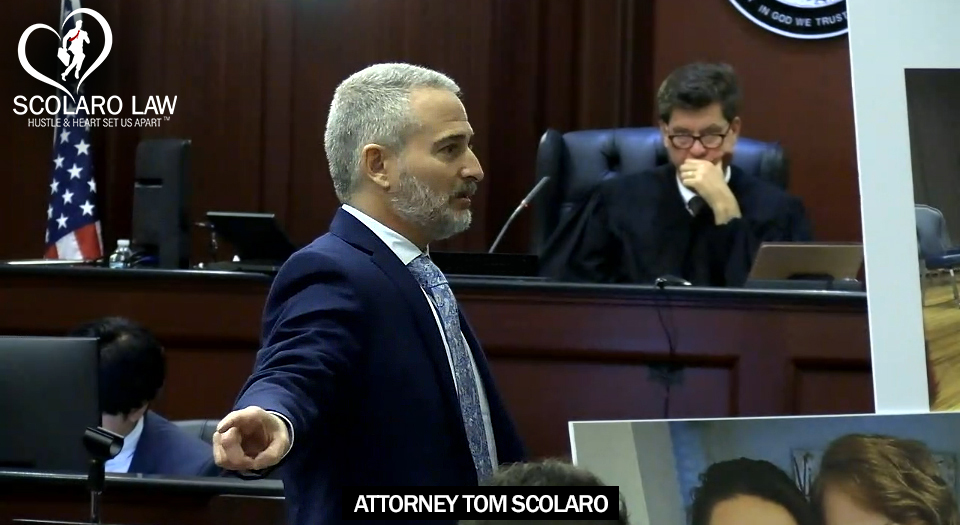
Get Started with a Free Consultation
If you were injured in an incident in Florida, contact us by filling out this form.
"*" indicates required fields
Attorney Thomas Scolaro Secures $17 Million Judgment in Key West Fatal Parasailing Accident
June 20, 2024
On July 17, 2020, a tragic parasailing accident claimed the life of a 36-year-old man from Costa Rica and later resulted in the death of his 29-year-old girlfriend from San Antonio, Texas. The couple had booked a parasailing trip with Sunset Watersports while on vacation in Key West. Despite dangerously high winds and rough seas, the boat captain, Andrew Santeiro, proceeded with the trip. Less than a minute after they were lifted into the air, the towline broke, and the parasail plummeted into the water due to the adverse weather conditions.
The victims were dragged through the water by powerful gusts of wind. Tragically, the section of the towline connected to the boat became entangled in the propeller, and as a result nearly ten minutes passed before the bodies were brought back on the boat.
Eyewitnesses and weather reports indicated that conditions were unsafe for parasailing. The National Weather Service had reported a “thundery squall” passing through Key West around the time of the crash, with peak wind gusts reaching approximately 35.5 mph. Florida law prohibits parasailing in wind conditions over 20 mph or wind gusts exceeding 25 mph. Despite these clear regulations, Santeiro chose to proceed, leading to the devastating accident.
Numerous Grossly Negligent Acts Led to an Avoidable Tragedy
The parasailing company’s decision to operate despite multiple weather alerts was a gross violation of safety protocols. The captain’s failure to check equipment and heed weather warnings, alongside his negligent response during the emergency, highlighted severe lapses in judgment and training.
Eyewitnesses reported that the captain exhibited a reckless, “cowboy attitude,” ignoring passengers’ pleas to slow down and failing to recognize the imminent danger. Other local parasailing companies had prudently ceased operations due to the storm, underscoring the negligence of Sunset Watersports and its captain.
Florida Statute 327.375 prohibits parasailing if the observed wind conditions are more than 20 mph or wind gusts are more than 25 mph. The captain’s decisions led to a wrongful death lawsuit filed by the family of the deceased man. The case highlighted that Santeiro neglected to take all available means to determine the weather before launching the couple into flight. Multiple witnesses stated that the boat nearly capsized from the forces applied by the parasail in high wind.
Manslaughter Charges
A year after the incident, Andrew Santeiro was charged with manslaughter by “culpable negligence.” This charge is defined as conduct showing reckless disregard for human life or for the safety of others, or conduct showing an entire lack of care which raises a presumption of indifference to the consequences. He was arrested and taken to the county jail on Stock Island but was released after posting a $230,000 bond. The criminal case is still ongoing today.
The arrest warrant from the Florida Fish and Wildlife Conservation Commission (FWC) detailed that Santeiro neglected to cease operations despite wind speeds that exceeded the legal limit for parasailing. The FWC investigation found that at the time of the crash, wind speeds averaged 18.5 mph with gusts of 25.5 mph, and peak gusts reached 35.5 mph.
The Outcome
Attorney Thomas Scolaro filed a wrongful death lawsuit against both the captain and Sunset Watersports, citing their utter disregard for passenger safety and numerous violations of Florida law. The case was brought on behalf of the victim’s 10-year-old son and his mother. After a rigorous legal battle, Scolaro secured a judgment of $17 million.
Florida Law and the Parasailing Industry
For many years, the parasailing industry in Florida operated with zero regulation or oversight, leading to numerous accidents and fatalities. The lack of oversight and standardized safety protocols meant that operators often made decisions based on their judgment, which could be influenced by profit motives rather than safety concerns. This laissez-faire approach resulted in a series of tragic incidents that highlighted the urgent need for regulation.
The Turning Point
The tragic death of Amber May White in 2007 was a pivotal moment for the parasailing industry in Florida. Amber May was just 15 years old when she and her sister were involved in a fatal parasailing accident in Pompano Beach. The towline snapped, causing the girls to crash into a building and subsequently fall onto parked cars. This heartbreaking incident brought national attention to the dangers of an unregulated parasailing industry.
In response to this tragedy, Florida lawmakers enacted the Amber May Law in 2014. This legislation was the first of its kind in the state, establishing crucial safety standards and regulations for commercial parasailing operations. The law was a significant step toward ensuring the safety of parasailing participants and preventing future tragedies.
Key Provisions of the Amber May Law
The Florida statute addressing parasailing safety regulations is codified in Chapter 327, Section 327.375 of the Florida Statutes. Known as the Amber May Law, this section was enacted to strengthen safety protocols for commercial parasailing operations. The Amber May Law introduced several critical safety measures that parasailing operators must adhere to:
- Weather Restrictions: Parasailing is prohibited if sustained winds exceed 20 mph, if gusts are 15 mph higher than the sustained wind speed, or if wind gusts exceed 25 mph. This provision aims to prevent accidents caused by high winds, which can make parasailing extremely dangerous.
- Equipment Requirements: The law mandates regular inspections of all parasailing equipment, including the towline, harness, and parasail. Operators must ensure that all equipment is in good working condition and meets safety standards.
- Insurance Coverage: Parasailing operators are required to carry a minimum of $1 million in liability insurance. This requirement helps ensure that victims of parasailing accidents can receive compensation for their injuries or losses.
- Safety Briefings: Operators must provide thorough safety briefings to all participants before allowing them to parasail. These briefings should cover safety procedures, emergency protocols, and what to expect during the ride.
- Age and Weight Restrictions: The law sets minimum age and weight requirements for parasailing participants to ensure that individuals are physically capable of handling the experience.
Distance from Shore: Parasailing is restricted to certain distances from the shore, typically no more than 800 feet. This measure is intended to minimize the risks associated with parasailing over open water, where rescue operations can be more challenging.
The Impact of Regulation
Since the implementation of the Amber May Law, the parasailing industry nationwide has seen some improvement in safety standards. Other popular coastline States have passed similar regulations in the last 15 years, which have helped reduce the total number of accidents and fatalities. Operators are now more accountable, and the requirements ensure that safety is prioritized over profit.
The journey toward regulating the parasailing industry in Florida has been long and fraught with challenges. The Amber May Law represents a significant milestone in this journey, providing a framework for ensuring the safety of parasailing participants. As the industry continues to evolve, it is essential for lawmakers, operators, and participants to remain vigilant and committed to upholding the highest safety standards.
However, incidents still occur, underscoring the need for more stringent regulations. Recent cases, such as the tragic accident in Key West mentioned above, serve as reminders that there is still a dire need for greater public safety. In the meantime, for those considering a parasailing adventure, it is crucial to choose reputable operators who comply with all safety regulations.

CATASTROPHIC INJURIES REQUIRE utmost personal injury Experience
With over 25 years of experience as a personal injury attorney, Tom Scolaro has dedicated his career to seeking justice for individuals who have suffered due to the negligence of others. Throughout his career, he has consistently secured significant verdicts and settlements for his clients, driven by a commitment to obtain the best result possible in every single case.
“One of the hallmarks of Scolaro Law is our commitment to obtaining the highest recovery and putting the lives of our clients back together”
Scolaro Law’s team has over 100 years of collective experience litigating personal injury cases throughout the State of Florida, including parasailing accident cases. If you or a loved one has been injured during a parasailing ride, contact Scolaro Law by filling out the case evaluation form on our website and we will get back to you immediately.

